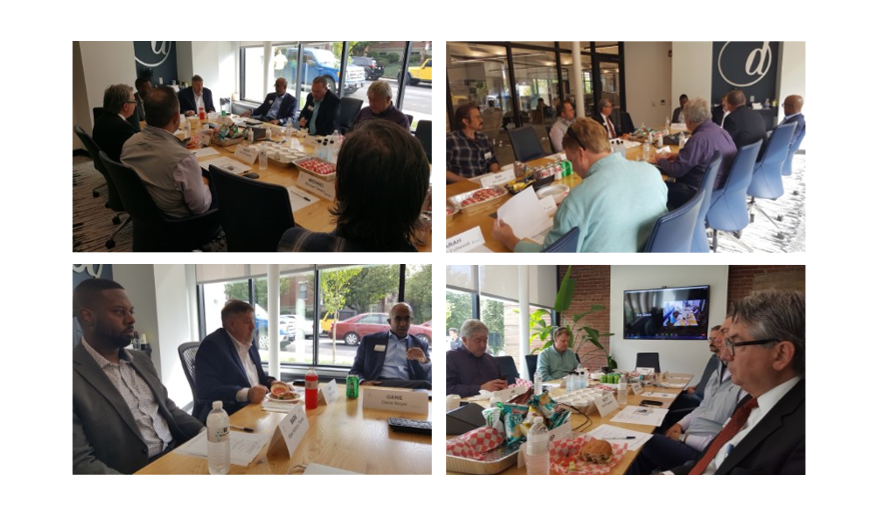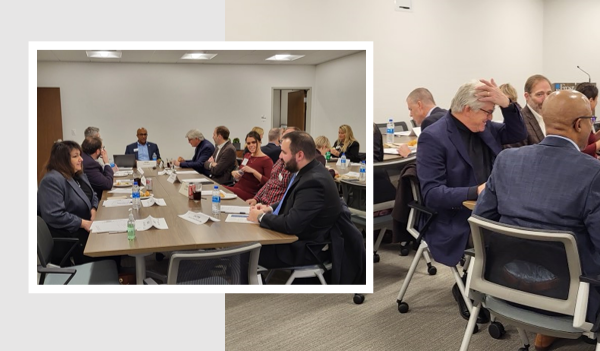Pittsburgh November 2021 – Key Take-Aways
- Sarah Fullwoord, University of Pittsburgh Innovation Institute: The institute provides support, educational resources and networking opportunities for businesses. Anyone is invited to the winter social on Dec. 6, from 6-9 p.m., at Heinz Field.
- AJ Pantoni, Hanna Langholz Wilson Ellis Inc.: This year has had velocity like never before seen. Normally at this time of year, things grind to halt, except for closings, but this year there are new projects and assignments. It’s been a great year for industrial folks.
- Nathan Pazsint, SVN Three Rivers Commercial Advisors (Guest): They are seeing medium-sized users and smaller users; lots of sub-leases. It’s the beginning of a cycle that likely will run for four-to-six quarters. People want a hybrid model because they are used to working at home. Hot areas in Pittsburgh are Wexford and Cranberry, as well as other sites in the North Hills. Major restaurant groups are not looking to move Downtown; their premise is to downgrade from fine dining to cash-and-carry, pop-up ideas, street foods. Big restaurant groups now want just 1,200 to 1,500 square feet of space, instead of 10,000 or 12,000.
- Victor Konno, Burns Scalo Real Estate: Seeing businesses looking for a hybrid model that has employees in the office three days and working remotely two days. they are fortunate that their product is Class A. The Parkway West area has older buildings, but they are getting traction from companies looking to downgrade the size of their space. They have space available now. Many waited until the last minute to see how the market might recover, and they don’t have time for full build-out. They want a nicer space but one that’s ready to go, with furniture in place. It is important to upgrade space if you’re asking employees to come back to the office.
- Ray Steeb, eFacility LLLC: They are finding that major players in manufacturing are looking for products like theirs because they can’t find labor; they want to get stuff done. Their product supports people who want to do things 25 percent faster. Forget about the budget; prices are going up. People are doing preventive maintenance; they have a group with multiple manufacturing plants, and have a major international player looking to get into their system because there aren’t enough people to do work. Clients are starting to worry about maintenance for when they do come back — HVAC systems, filters, etc. — and they’re asking questions not normally heard.
- Shannon Rometo, Burns Scalo Real Estate: Renewals are harder these days and demising. People come into spaces and don’t want full square footage; they want to chop it up. The suburbs are hot for leases. People came in during the pandemic, if they had ground-level sites with their own restrooms, own kitchens. Lots going on in Class A retail, too. They are building The Piazza, a new eight-acre retail center in South Fayette. It’s five buildings with shops. Firebirds Wood Fired Grill is one customer who signed up (as a second location). They are competing with Southpointe and Downtown, so bringing walkable property to the suburbs.
- Chip Desmone, Desmone Architects (Host): They are test-fitting about 15 to 20 properties around the Strip District, Lawrenceville and McKnight Road corridor for multifamily projects. A lot of the work they are doing is for out-of-town investors. Pittsburgh appears to finally be on the radar, perhaps because there’s been enough national investment. Working on eight or nine restaurants now, including a Dave and Busters in Morgantown. Also seeing a fair amount of institutional stuff — typically, college and universities represent 25 percent of the firm’s work but they froze during pandemic. They are now seeing some of that multifamily move into institutional clients and classroom renovations; they expect people to come back. Cal U, WVU, CMU, Pitt, CCAC — these clients are bullish on the future. That’s a good sign. The only region with problems is Downtown: People are skittish about being Downtown until PNC, Federated, UPMC, and other big businesses are back in buildings. Retail taking a huge hit Downtown. There’s nowhere to get lunch sometimes.
- Kim Harkobusic, Liberty Insurance Agency (Guest): She focuses on commercial real estate and industrial parks and finding ways to help reduce premiums for large properties with risks. Typically, one user can drive premiums way up. Craft brewing and hospitality are huge right now. Lots of properties are under-insured by about 50 percent. They tell brokers to have conversations with insurance folks before signing a lease. Since the pandemic, “pollution” is being removed from all policies that would give you a payout – if you want a bacterial endorsement, that will cost you quite a bit.
- Dave Daquelente, Master Builders Association of Western Pennsylvania Inc.: They are a 135-year-old contractors association. The association world is a unique hodgepodge of services, with experts in several fields. There are 37 general contractor members, 92 specialty contractors, and 111 affiliate members (accountants, insurance brokers, etc.) They are a union contractor association; you must have two signatory agreements that they negotiate. Their contractors and labor partners provide a high value. With the pandemic and people not returning to work, construction didn’t necessarily stop, except briefly, but the cost of doing business has definitely gone up.
- Jim Gibbs, Meter Feeder (Guest): The city has been losing billions of dollars trying to share curb space with vehicles like delivery trucks. With Meter Feeder, people turn their cars off and that starts the meter. The city can make money and people stop getting tickets. There’s an app where you pay for parking, that’s also available in the suburbs. The company also does parking enforcement, which sets it aside from others; if you get a ticket, you can make parking ticket payments. Ushering in this new parking technology is especially good for fleets. Things are really busy, and Meter Feeder is moving into Cedar Rapids, Iowa, Chattanooga, Tenn., and the New Jersey transit. He thought parking would be a sleeper industry but it’s moving really quickly. The technology that works for fleets and delivery vehicles is similar to the check engine light — OBD2 port. When you turn the vehicle off, the device has a sim card in it that sends a latitude/longitude and state time stamp, so they start charging the amount you should be paying. When you turn on and drive away, it stops. You’re paying with a local company, so they spend the money here. You can park anywhere in the city using Meter Feeder, except they are not in the garages that are run by Alco (including the airport) or the Parking Authority.
- Gene Boyer, Burns Scalo Real Estate (Champion): They are growing our construction development and management/operation services for third-party clients. They build and operate properties, and for the first time in 65 years, they are going to take best-in-class services to select third-party clients. Interior fit-outs are ideal. They can do everything from 2,000-square-foot retail buildout to a client with land who needs to build a building. Depending on the market, it could be out of Pittsburgh. This time of year, people usually go on cruise control, with the holiday scene, but everybody is working hard because of the last two years. Lots of people are seeking second-generation space. There’s a segment of the market that doesn’t want to spend time or much money because they paid for empty space over the past year. Or people have space they like but want to refresh it; they bring a unique perspective with Class A development.






Recent Comments